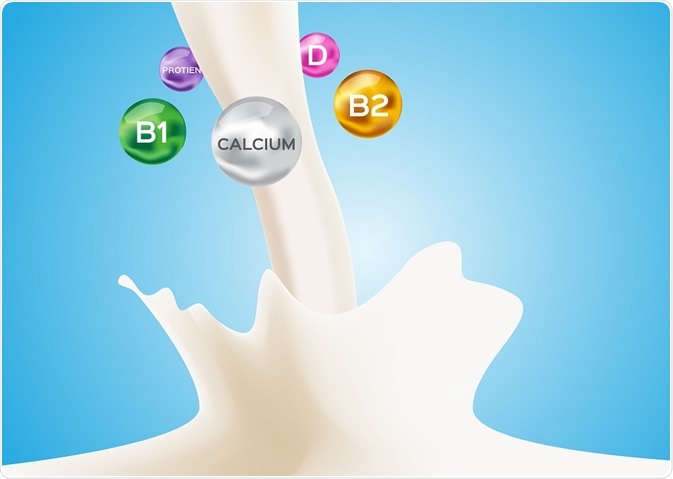There has recently been a sharp rise in the number of cases of rickets in the United Kingdom and the United States. This disease is primarily caused by a dietary deficiency in vitamin D and calcium, resulting in the softening of bones and symptoms of bow-leggedness, delayed growth, and weakness.
 gritsalak karalak | Shutterstock
gritsalak karalak | Shutterstock
Vitamin D and calcium are the mainstays of treatment for persons with osteoporosis, a disease of adults characterized by porous and weakened bones.
What is the function of Vitamin D and Calcium?
Vitamin D is important for the absorption of minerals such as calcium and phosphorus in the body. The minerals are absorbed from ingested food and supplements and deposited in the bones.
Vitamin D has been referred to as the ‘sunshine vitamin,’ as skin exposure to sunlight is required to convert a precursor of vitamin D found in food sources to a form of vitamin D that can be used by the body. Cutaneous synthesis provides approximately 80% of the required vitamin D to the body. However if sunlight exposure is limited (as occurs in especially cold regions during wintertime), there is increased dependency on dietary sources to achieve necessary vitamin levels.
Calcium plays an important role in maintaining bone architecture, but is also required for regulating other functions such as blood coagulation, heart contractility, and neuromuscular activity.
What are some dietary sources of vitamin D and calcium?
Fish
Fish is the best nutritional source of vitamin D. The flesh of fatty fish, such as tuna, mackerel, and salmon, are rich in vitamin D. Just 3 ounces of cooked salmon provides nearly 450 International units (IU) of vitamin D. Cod liver oil is another popular source of vitamin D and can provide about 1,360 IU of vitamin D.
Milk and dairy products
Milk and dairy products, such as cheese (particularly ricotta cheese) and yogurt, are rich in both vitamin D and calcium. However, dairy products also tend to be high in fat, so they should be used in moderation as part of a balanced diet to prevent unnecessary weight gain.
Egg yolks
Per the United States Department of Agriculture (USDA), a large egg, weighing approximately 50 g, contains approximately 50 IU of vitamin D3, with the largest concentration of calcium in the yolk. Including whole eggs in one’s diet can help increase vitamin D intake.
Mushrooms
Cultivated mushrooms contain the plant sterol ergosterol, which is a vitamin D precursor. When mushrooms are exposed to sunlight; they naturally produce vitamin D.
Vegetables
Dark green vegetables like kale, spinach, okra, and collards are rich in calcium. These vegetables are an important component of vegan diets, which do not include animal-based foods.
Dietary intakes of vitamin D and calcium are necessary to promote bone health and prevent bone disease. These few natural foods are rich in vitamin D and calcium. Fortification of food with vitamin D and calcium is a safe and effective way to ensure that most people living in the United States and the United Kingdom reach their recommended daily intake levels.
Further Reading
Last Updated: Jun 5, 2023